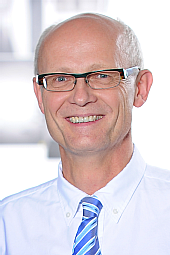- Startseite
- Forschung
- Translationale Molekularpathologie - AG Odenthal
Translational Diagnostics
The team of translational diagnostics has established high through-put qPCR and Next Generation Sequencing (NGS). In recent clinical collaborations, we have transferred our expertise in NGS to the analysis of circulating biomarkers. Thus, we presently study circulating, cell-free (cf) DNA, deriving from tumor cells, for the mutation pattern by ultra deep sequencing.
In addition, we are addressing the analysis of mutation profiles, gene fusions and rearrangements, as well as altered gene expression patterns during tumorogenesis by a novel approach, which combines targeted ultra-deep RNA/cDNA sequencing with the genomic DNA NGS approach. In close cooperation with the team of Professor Dr. Alexander Heidenreich (Department of Urology, University Hospital of Cologne) we will first establish this technology on prostate cancer. Furthermore, we are studying gene amplifications and deletions as well as DNA methylation in various cancer types. In order to evaluate tumor heterogeneity, variants of the entire mitochondrial genome are studied by ultra-deep sequencing of DNA from different tumor lesions or areas.
Network Genomic Medicine Lung Cancer
Lung Cancer Group Cologne (LCGC)
Epigenetic Mechanisms in Cancer
Our lab has a focus on analyzing the role of those epigenetic writers in oncogenic signal pathways particulary related to the lung cancer paradigmatic genetic lesions. Chromatin Immunoprecipitation (ChIP) combined with next-generation sequencing (ChIP-Seq), transcriptome (RNA-Seq), and mass spectrometry analyses are used to unravel the molecular network through which LSD1 governs the oncogenic signaling pathways.
The understanding of the molecular network regulated by key epigenetic writers requires genome-wide data analysis like ChIP-Seq, RNA-Seq and whole genome/exome sequencing. In cooperation with Peter Nürnberg (Cologne Center for Genomics) and Roman Thomas (Department of Translational Genomics), we are establishing a variety of data analysis tools to interpret genome-wide data.
Conditional mouse tumor models forming lung cancer either upon KRAS or EGFR mutation are used to investigate the roles of epigenetic writers in modulation of oncogenic signaling pathways during tumor development. Given that epigenetic writers modulate oncogenic signaling driven by the paradigmatic oncogenic mutations, in a close cooperation with the Network Genomic Medicine (NGM) and Clinical Lung Cancer Genome Project (LCGP) we aim to investigate the correlation of epigenetically controlled genes with clinical responses, secondary mutations and outcome of targeted therapies.
Publications
Cellular and Extracellular miRNAs in Chronic Liver Disease
Our main scientific focus is the function of cellular and cell-free miRNA in liver fibrosis and hepatocellular carcinoma. In previous cooperative studies we investigated circulating miRNA profiles in patients with acute and chronic liver disease as potential biomarkers. Presently, the team is addressing epigenetic regulation of miRNA expression and the mechanisms, which control miRNA secretion.
European Foundation for the Study of Chronic Liver Failure (EF-CLIF)



